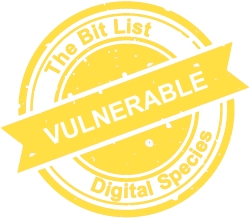Published Research Papers
 |
||
|
Completed research papers published in serials, monographs or theses which fall under specific collecting policies of research libraries or archives and are managed through dedicated repository infrastructures. |
||
|
Digital Species: Research Outputs |
Trend in 2022:
|
Consensus Decision |
|
Added to List: 2017 |
Trend in 2023:
|
Previously: Vulnerable |
|
Imminence of Action Action is recommended within three years, detailed assessment within one year. |
Significance of Loss The loss of tools, data or services within this group would impact on people and sectors around the world. |
Effort to Preserve | Inevitability It would require a small effort to preserve materials in this group, requiring the application of proven tools and techniques. |
|
Examples Published research papers in scholarly E-Books and Electronic Journals; Electronic manuscripts; Electronic theses (E-theses). |
||
|
‘Endangered’ in the Presence of Aggravating Conditions Lack of documentation; lack of clarity with respect to intellectual property; embedded complex objects; unstable funding for repository; lack of strategic investment; complex external dependencies; lack of persistent identifiers; bespoke formats; lack of legal deposit mandate. |
||
|
‘Lower Risk’ in the Presence of Good Practice Strong documentation including intellectual property rights; clarity of preservation path and ensuing responsibilities; credible preservation plan; proven capacity of repository; legal deposit preservation copying; post-cancellation access service; persistent identifiers used consistently; non-proprietary formats used and validated; minimal or well managed external dependencies. |
||
|
2023 Review This entry was added in 2017 under 'Published research outputs,' though without reference to the capacity of the repository infrastructure. The 2019 Jury amended it to presume the existence of repository infrastructure and noted that the aggravating conditions (which introduce risks) and good practice enhancements (which reduce it) are most relevant to repository operations. While the 2020 Jury found no change in trend, the 2021 Jury agreed it should remain Vulnerable but discussed improvements and initiatives towards the preservation of research data and outputs, pointing to a trend towards reduced risk. The 2023 Council agreed with the Vulnerable classification, noting a slight decrease in imminence of action with no significant trends towards greater or reduced risk. Additionally, the Council recommended that a nomination received for a new ‘E-theses’ entry would provide a valuable example to this entry rather than as a new, standalone entry. However, as noted in the additional comments below, a recommended rescoping of the entry planned the next Bit List will revisit this nomination again as part of a restructuring. |
||
|
Additional Comments The 2023 Council additionally recognize that further scoping and input are needed for this entry and recommend that the next major review revisit and restructure the entry, in particular looking at restructuring based on differences between:
A 2023 nomination for E-theses highlights distinct risks tied to these digital published materials. E-theses tend to be sole documents which when published by universities may get harvested into other aggregators or resources but in many cases the only copy (with no physical/analogue copy) sits on an Institution's repository. In addition, many are deposited in PDF format (of many varieties and many don't even attempt to use PDF/A etc.) risking long term accessibility and re-use. However, the breadth of risks goes beyond just the PDF variety, as e-theses often include databases, audiovisual materials, websites, and more. The loss of tools, data or services within this group would impact on people and sectors around the world. Particularly those involved with reproducibility and those wishing to use the datasets for further research. Although there have been improvements in current practice, policies and workflows, there is still a significant corpus of information that was deposited before these improvements came into force. It is unlikely that there will be the time, will or resources to bring this information up to current standards. See also:
|
||






























































































































